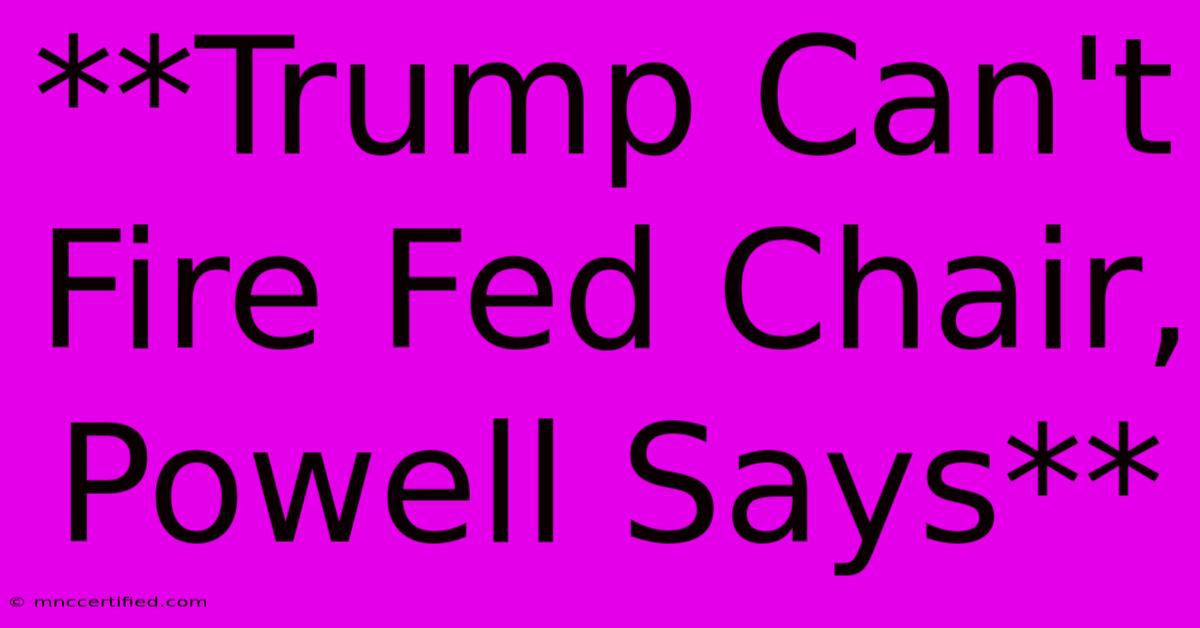**Trump Can't Fire Fed Chair, Powell Says**

Table of Contents
Trump Can't Fire Fed Chair, Powell Says: A Look at the Independence of the Federal Reserve
The recent comments by Federal Reserve Chair Jerome Powell, stating that President Trump cannot fire him, have reignited discussions about the independence of the central bank and its role in the US economy. This statement, made during a congressional hearing, was a direct response to President Trump's repeated criticisms of the Fed's monetary policy decisions, particularly its interest rate hikes.
Understanding the Fed's Independence
The Federal Reserve, often referred to as the "Fed," is the central bank of the United States. Its primary responsibilities include controlling the money supply, setting interest rates, and overseeing the banking system. The Fed's independence from political influence is considered a cornerstone of its effectiveness in managing the economy.
Why is the Fed's independence crucial?
- Stable Monetary Policy: Independence allows the Fed to make decisions based on economic data and long-term goals, rather than short-term political pressures. This promotes stability in the financial system and protects the value of the dollar.
- Inflation Control: The Fed can focus on controlling inflation without fear of political repercussions. This ensures a stable economic environment for businesses and consumers.
- Economic Growth: A stable and predictable economy encourages long-term investment, leading to sustained economic growth.
Trump's Attempts to Influence the Fed
President Trump has repeatedly criticized the Fed's interest rate hikes, claiming they are hindering economic growth. He has also publicly expressed his desire for lower interest rates, even going as far as suggesting that Powell should be fired.
However, the Fed Chair's position is not subject to the President's whims. The Federal Reserve Act of 1913, which established the Fed, grants the Chair a four-year term and allows them to be removed only for "cause." This means that the President can only dismiss the Chair for specific reasons, such as malfeasance or incompetence, not for disagreeing with their economic policies.
The Implications of Powell's Statement
Powell's assertion that he cannot be fired underscores the crucial principle of the Fed's independence. It sends a strong message that the central bank will not be swayed by political pressures and will continue to prioritize the long-term health of the US economy.
However, the situation also raises concerns:
- Political Interference: The President's public criticism of the Fed raises concerns about potential political pressure on the central bank, even if he cannot fire the Chair directly.
- Public Trust: The ongoing debate about the Fed's independence may erode public trust in the central bank, potentially affecting its ability to effectively manage the economy.
The Future of the Fed's Independence
The debate over the Fed's independence is likely to continue. While the current legal framework protects the central bank from direct political interference, the President's actions highlight the importance of maintaining a clear separation of powers and ensuring that the Fed remains free to act in the best interests of the US economy.
Moving forward, it is crucial to ensure that the Fed's independence remains strong, allowing it to fulfill its vital role in maintaining a stable and prosperous economy.

Thank you for visiting our website wich cover about **Trump Can't Fire Fed Chair, Powell Says**. We hope the information provided has been useful to you. Feel free to contact us if you have any questions or need further assistance. See you next time and dont miss to bookmark.
Featured Posts
-
Rhinoplasty Covered By Insurance Near Me
Nov 08, 2024
-
Why Is Chiropractic Covered By Insurance
Nov 08, 2024
-
Kidney Stone Surgery Cost With Insurance
Nov 08, 2024
-
Bad Faith Insurance Attorney Los Angeles
Nov 08, 2024
-
Scholz Coalition Crumbles Germany In Crisis
Nov 08, 2024